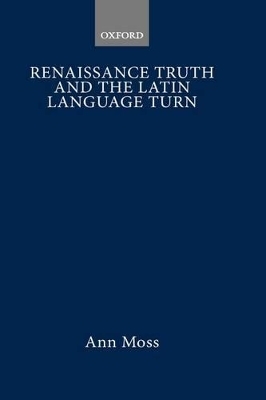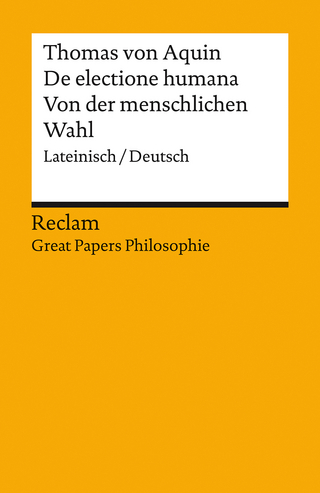
Renaissance Truth and the Latin Language Turn
Oxford University Press (Verlag)
978-0-19-924987-9 (ISBN)
Renaissance Truth and the Latin Language Turn provides an entirely new look at an era of radical change in the history of West European thought, the period between 1480 and 1540, mainly in France and Germany. The lens for this novel perspective is the Latin language shift, from the Latin idiom in which late medieval intellectual inquiry was conducted to the reinvented classical idiom aggressively promoted and finally imposed by the humanists. This is not a narrow philological study of language change. The book's main thesis is that the Latin language turn was not only concurrent with other aspects of change, but was a fundamental instrument in reconfiguring horizons of thought, reformulating paradigms of argument, and rearticulating the relationship between fiction and truth. The book examines particularly crucial documents by a few major figures (Erasmus, Lefèvre d'Étaples, Melanchthon), but it is original in the way it brings to the fore the contributions of secondary writers who rarely find their way into general histories of the period, but who are important markers of stages in the shift that the book is charting, and hence of the overall change that shift helped to engineer. The book is very wide-ranging in its scope. Many of its topics feature for the first time in a synthesizing account of the intellectual history of the period. They include the history of Latin dictionaries and phrase-books; discourses of theological debate and popular piety; the changing ground-rules for religious disputation; early ventures in literary criticism; the emergence of personal subjectivity and a new religious sensibility; and the posthumous fortunes and misfortunes of a major saint.
Ann Moss is Professor of French and Head of the School of Modern European Languages at Durham University. Her publications include: Ovid in Renaissance France: a Survey of the Latin Editions of Ovid and Commentaries published before 1600 (London: The Warburg Institute, 1982) Poetry and Fable: Studies in Mythological Narrative in Sixteenth-Century France (Cambridge: Cambridge University Prees, 1984) Printed Commonplace-Books and the Structuring of Renaissance Thought (Oxford: Clarendon Press, 1996) Latin Commentaries on Ovid from the Renaissance, Library of Renaisssance Humanism 5 (Signal Mountain, Tennessee: Summertown, 1998) Four chapters in Norton, G. P. (ed.), The Cambridge History of Literary Criticism, iii: The Renaissance (Cambridge: Cambridge University Press, 1999) Les Recueils de lieux communs: apprendre à penser à la Renaissance (Geneva: Droz, 2002)
1. Introduction ; 2. Words: Dictionaries ; 3. Words: Phrases ; 4. Words: Composition ; 5. Arguments: Paris ; 6. Arguments: Leipzig (and elsewhere) ; 7. Arguments: Common places ; 8. Narration: Producing narrative ; 9. Narration: Reading fiction ; 10. Narration: Turning inward ; 11. Coda ; Bibliography ; Index
| Erscheint lt. Verlag | 1.10.2003 |
|---|---|
| Verlagsort | Oxford |
| Sprache | englisch |
| Maße | 162 x 242 mm |
| Gewicht | 620 g |
| Themenwelt | Geisteswissenschaften ► Philosophie ► Philosophie des Mittelalters |
| Geisteswissenschaften ► Sprach- / Literaturwissenschaft ► Sprachwissenschaft | |
| Sozialwissenschaften | |
| ISBN-10 | 0-19-924987-3 / 0199249873 |
| ISBN-13 | 978-0-19-924987-9 / 9780199249879 |
| Zustand | Neuware |
| Haben Sie eine Frage zum Produkt? |
aus dem Bereich


